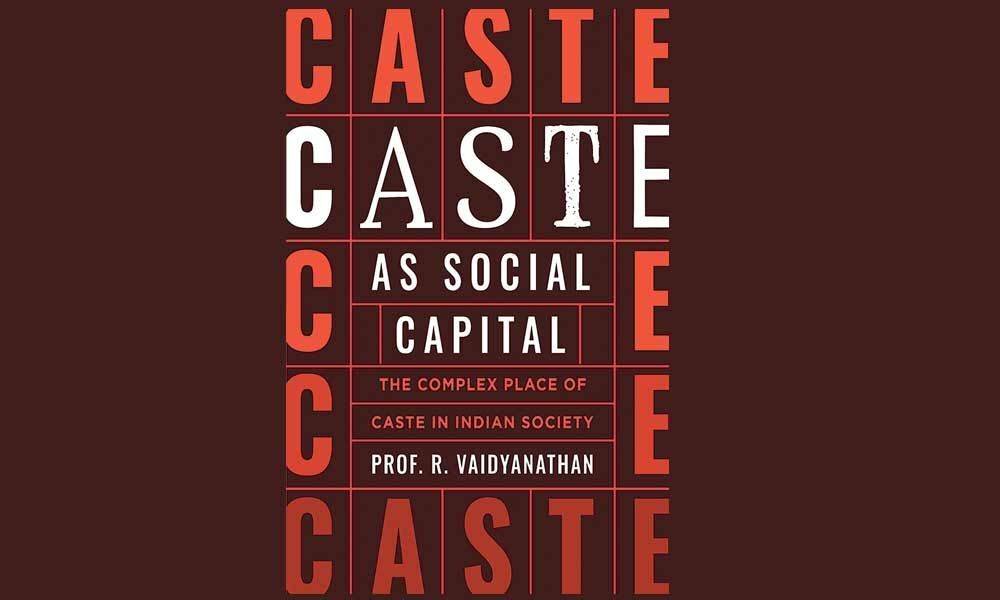Live
- Centre transfers Rs 2.23 lakh crore for 1,206 schemes under Direct Benefit Transfer
- BGT 2024-25: Watching Konstas bat reminds me of Symonds, says Hayden
- 75 iconic lighthouses in India saw more than 10 lakh visitors till September
- Societal inequality may reduce brain health: Study
- United Cup: Rybakina, Shevchenko clinch mixed doubles to seal Kazakhstan's win over Spain
- Samagra Shiksha Employees Intensify Strike, Demand Job Regularization in Telangana
- My uncle was always a family man: Manmohan Singh’s nephew
- 71 Smart Cities develop 9,433 smart classrooms in 2,398 govt schools: Report
- New cruise season opens at NMPA!
- Sikh Community Pays Glorious Tributes to Former Prime Minister Manmohan Singh
Just In

Caste as Social Capital examines the workings of caste through the lens of business, economics and entrepreneurship…through this qualitative view of caste, an entirely new picture emerges of caste which forces one to view this age-old institution in new light…
Caste as Social Capital examines the workings of caste through the lens of business, economics and entrepreneurship…through this qualitative view of caste, an entirely new picture emerges of caste which forces one to view this age-old institution in new light…
Clusters occupy a significant place in the economic scenario in India and play a crucial role in the development of the Indian businesses.
Their contributions to national income, employment, exports and innovation is very significant.
The United Nations Industrial Development Organisation (UNIDO) has estimated the presence of approximately 350 small-scale industrial clusters and around 2000 rural- and artisan-based clusters in the country contributing about 60 per cent of the manufacturing done for exports and constituting about 40 per cent of the employment in the manufacturing industry.
The Ministry of Small-Scale Industries, Government of India, has estimated that there are 2042 clusters of which 1223 are in the registered sector in twenty-six states and another 819 in the unregistered sectors in twenty-five states and union territories.
Clusters can be defined as sectoral and geographical concentration of enterprises, particularly in the small and medium enterprises (SME) sector.
Faced with common opportunities and threats, these clusters give rise to external economies, for instance, through specialised suppliers of raw materials, components and machinery, sector-specific skills and so on.
Clusters also favour the emergence of specialised technical, administrative and financial services, create a conducive ground for the development of inter-firm cooperation and specialisation as well as of cooperation among public and private local institutions to promote local production, innovation and collective learning.
In the year 2000, a team including chartered accountants, academicians, businessmen and others visited and studied forty-five economic clusters covering ten jatis/communities engaged in fifty different industries, businesses and services in the states of Tamil Nadu, Gujarat, Punjab, Karnataka and united Andhra Pradesh.
The studies were mostly interactive and aimed to understand the functioning of clusters. We found that most of the clusters specialised in a particular economic activity and were run by specific caste groups.
The clusters contributed significantly to output, employment and exports in the different States.
The study of several clusters spread across several regions of the country points to the role of community in the emerging entrepreneurial development.
Most government-commissioned studies do not stress on the caste and community linkages of clusters, choosing to focus only on economic activities instead.
The organisation of industry into homogeneous clusters has been a historical phenomenon.
Even for large industries, clusters develop ancillary industries. Being a part of a cluster is important for the sustainable growth of MSMEs. In handloom, handicrafts and modern SME Industry segments.
In addition to the clusters, it is estimated that there are about 2500 unmapped rural industry cluster the country.
Studies on Clusters:
Clusters can also be considered as part of a bigger value chain mechanism (including raw materials, intermediates, finished products and marketing) where the value chain extends beyond geographically defined boundaries.
Defined by relationships rather than a particular product or function, clusters include organisations across multiple traditional industrial classifications which make drawing the categorical boundaries of a cluster a challenge.
-Extracted with permission.

© 2024 Hyderabad Media House Limited/The Hans India. All rights reserved. Powered by hocalwire.com







